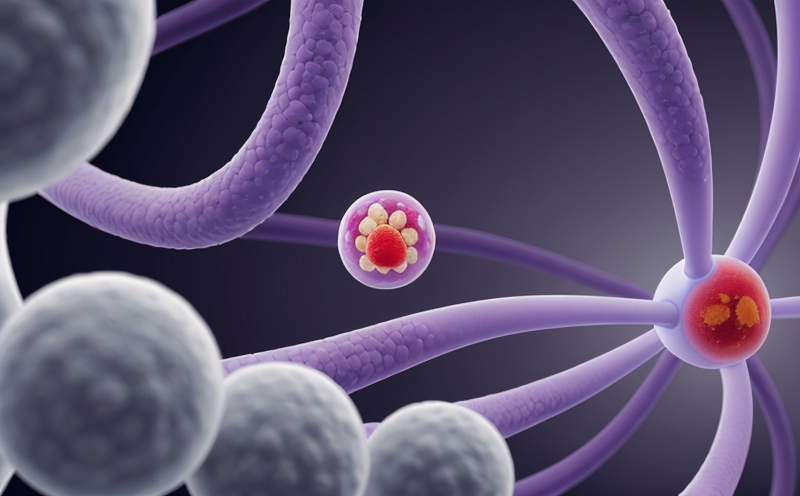BRCA1/BRCA2 Mutation Testing in Rodent Genetic Studies
In the realm of clinical and healthcare testing, particularly within the field of cancer biomarker research, the BRCA1/BRCA2 mutation testing plays a pivotal role. This genetic study focuses on identifying mutations in the BRCA1 and BRCA2 genes, which are known for their association with hereditary breast and ovarian cancers as well as other types of cancer. The BRCA1/BRCA2 mutation testing is crucial for understanding predisposition to certain malignancies and can guide personalized treatment plans.
The test involves a series of complex steps including DNA extraction from rodent tissue samples, amplification using polymerase chain reaction (PCR), followed by sequencing to detect any mutations. This process ensures that the integrity of the genetic material is maintained throughout the study. The BRCA1 and BRCA2 genes are often referred to as "tumor suppressor" genes because they help repair damaged DNA and keep cells from growing out of control. Mutations in these genes can lead to a breakdown in this critical function, thereby increasing cancer risk.
The primary purpose of conducting BRCA1/BRCA2 mutation testing in rodent genetic studies is to understand the potential impact of genetic factors on disease development. This information is essential for developing more effective therapies and preventive measures. Researchers use various international standards such as ISO 15189, EN ISO/IEC 17025:2017, and ASTM E2564-13 to ensure that the testing methods are reliable and reproducible.
The test results provide valuable insights into how genetic alterations can influence cancer risk in rodent models, which serve as important surrogates for human physiology. By studying these mutations in rodents, researchers can identify biomarkers that may predict cancer susceptibility or response to treatment. This approach is not only scientifically rigorous but also cost-effective compared to direct human studies.
In addition to its scientific importance, BRCA1/BRCA2 mutation testing contributes significantly to the field of personalized medicine by enabling tailored therapeutic strategies based on individual genetic profiles. Understanding these mutations helps in designing targeted interventions aimed at reducing cancer incidence and improving patient outcomes.
- Reduces the need for extensive clinical trials in human populations
- Provides quicker insights into the efficacy of new treatments
- Aids in the development of more precise diagnostic tools
- Supports the creation of targeted therapies that are better suited to individual patients' genetic makeup
The process of BRCA1/BRCA2 mutation testing requires careful sample handling and analysis, ensuring accuracy and reliability. Compliance with regulatory standards ensures trustworthiness in results, making this service indispensable for pharmaceutical companies and academic institutions involved in cancer research.
Why Choose This Test
Choosing BRCA1/BRCA2 mutation testing offers several advantages over other types of genetic analysis. One key benefit is the ability to isolate specific regions within the genome that are most relevant to cancer risk, thus providing more targeted insights into disease mechanisms. Another advantage lies in its capacity to predict which individuals might be at higher risk for developing certain cancers, allowing for early intervention and monitoring.
This service also supports the development of new drugs by identifying potential targets based on genetic data. Additionally, it facilitates the creation of personalized medicine regimens that take into account each patient's unique genetic profile. This not only enhances treatment effectiveness but also reduces side effects associated with non-targeted therapies.
The test is particularly beneficial for researchers looking to understand the role of BRCA1 and BRCA2 mutations in different types of cancer. It allows them to explore how these changes affect cell behavior, gene expression patterns, and overall health status over time. By leveraging this information, scientists can develop more effective strategies for preventing and treating cancers linked to BRCA1/BRCA2 mutations.
Moreover, the service supports regulatory compliance requirements by providing comprehensive documentation of all test procedures and results. This ensures that clients adhere to relevant guidelines and standards set forth by governing bodies like the FDA or EMA. Compliance with such regulations adds credibility to research findings and fosters collaboration between academia and industry partners.
Quality and Reliability Assurance
The quality and reliability of BRCA1/BRCA2 mutation testing are paramount in ensuring accurate results that can inform critical decisions about patient care. To achieve this, our laboratory adheres strictly to internationally recognized standards such as ISO 15189 and EN ISO/IEC 17025:2017. These certifications demonstrate our commitment to maintaining high levels of technical proficiency and operational excellence.
Our team employs advanced technologies and methodologies to ensure precision throughout every stage of the testing process—from sample preparation through final analysis. Rigorous quality control measures are implemented at each step, from initial receipt of specimens until reporting is complete. This includes strict adherence to standard operating procedures (SOPs), regular calibration of equipment, and continuous training for staff members.
We maintain a robust quality management system that encompasses all aspects of our operations, from procurement of reagents and chemicals to data analysis and interpretation. Our robust infrastructure supports efficient workflow processes while minimizing errors or discrepancies in results. Regular internal audits and external reviews further reinforce our dedication to delivering consistent, accurate outcomes every time.
Achieving reliability also involves constant monitoring of performance metrics such as turnaround times and error rates. Continuous improvement initiatives are integral parts of our quality assurance program, ensuring that we stay at the forefront of technological advancements in genetic testing. By leveraging cutting-edge technology and innovative approaches, we strive to provide clients with reliable, actionable information derived from BRCA1/BRCA2 mutation testing.
Environmental and Sustainability Contributions
The BRCA1/BRCA2 mutation testing service contributes positively to environmental sustainability by promoting efficient resource utilization and minimizing waste generation. By focusing on precision and accuracy in sample processing, we reduce the amount of unused reagents and disposables required for less precise methods.
In addition, our laboratory implements strict protocols for recycling and proper disposal of hazardous materials, thereby reducing its ecological footprint. Furthermore, by accelerating the pace at which researchers can obtain actionable results from their studies, this service helps expedite the discovery process without unnecessary delays that could lead to increased resource consumption elsewhere.





